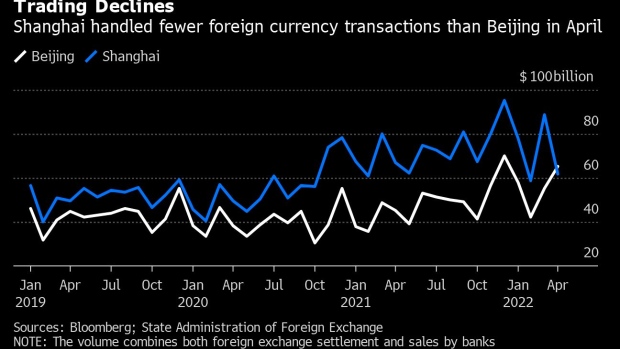May 25, 2022
Covid Lockdown Costs Shanghai Its China Currency Trading Crown
, Bloomberg News

(Bloomberg) -- The fallout of China’s Covid Zero policy is starting to show in Shanghai’s financial markets, with the city losing its top currency trading hub title for the first time.
Shanghai handled fewer currency deals than Beijing in April, to rank second among China’s 36 provinces and municipalities, according to the State Administration of Foreign Exchange. The decline points to another consequence of strict lockdowns and may serve as a case study for the possible implications of movement curbs in major Chinese cities, including Beijing, as Covid cases climb.
Traders volunteering to stay in the office, sleeping on trading floors, did little keep up currency volumes. Settlement and sales by banks for their clients, dropped 30% from March to $61.8 billion. That’s 15% of the national tally, compared with a steady share of around 20% before the lockdown, as per data going back to 2019.
The data precisely reflect that the lockdowns have had a profound impact on economic activities, said Peiqian Liu, chief China economist at NatWest Group Plc. “Corporates’ usual hedging, buying and selling of currencies has been affected, even though financial services may have been kept running normally to a large extent,” she said.
Prolonged Covid restrictions have damaged China’s economic prospects and prompted banks including UBS Group AG and Goldman Sachs Group Inc to slash their growth forecasts for this year. The impact on Shanghai’s economy has been dire. Not a single car was sold in the city last month and its industrial output plunged more than 20 times faster than rest of the nation.
Despite easing curbs, Shanghai is not completely out of the woods yet. Its vice mayor said last week that the city aims to return to normal life and restore full factory production by mid-to-late June.
Bad Timing
The currency trading disruption couldn’t have come at a worse time. The onshore yuan last month posted its biggest monthly loss since China unified its exchange market in 1994 as concerns over a Covid-stricken economy accelerated outflows from the nation’s financial markets and a widening monetary policy gap with the US dampened foreign appetite for Chinese debt.
Some banks in Shanghai and Beijing were short-staffed due to the Covid situation and couldn’t provide fresh quotations in time last month when demand for currency settlement increased significantly due to the sharp depreciation of the yuan, Zhong Chuan Finance Co. Ltd, a finance unit of the state owned China State Shipbuilding Corporation, said in an article on its official WeChat account.
The daily average dollar-yuan spot trading volume in the onshore market dropped to about $26 billion in April from $31 billion in the first three months of the year, according to Bloomberg calculations based on China Foreign Exchange System data. That’s even as authorities investigated the trading slump and waived currency trading fees for smaller firms.
Declining activity may not bode well for the city as it aims to boost the total financial transaction value to about 2,800 trillion yuan ($419 trillion) per year by 2025 as part of its plan to become a global financial center. “The recovery in Shanghai will be gradual and financial activities will still be subject to various degrees of lockdown,” NatWests’ Liu said.
©2022 Bloomberg L.P.






